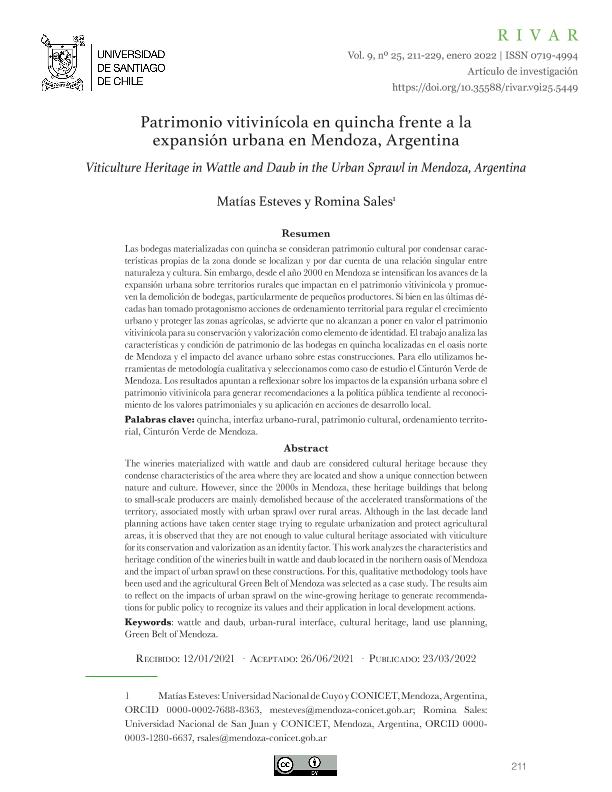Mostrar el registro sencillo del ítem
dc.contributor.author
Esteves, Matias Jose

dc.contributor.author
Sales, Romina Giselle

dc.date.available
2022-09-07T15:28:27Z
dc.date.issued
2022-02
dc.identifier.citation
Esteves, Matias Jose; Sales, Romina Giselle; Patrimonio vitivinícola en quincha frente a la expansión urbana en Mendoza, Argentina; Universidad de Santiago de Chile; Iberoamericana de Viticultura Agroindustria y Ruralidad; 9; 25; 2-2022; 211-229
dc.identifier.issn
0719-4994
dc.identifier.uri
http://hdl.handle.net/11336/167743
dc.description.abstract
Las bodegas materializadas con quincha se consideran patrimonio cultural por condensar características propias de la zona donde se localizan y por dar cuenta de una relación singular entre naturaleza y cultura. Sin embargo, desde el año 2000 en Mendoza se intensifican los avances de la expansión urbana sobre territorios rurales que impactan en el patrimonio vitivinícola y promueven la demolición de bodegas, particularmente de pequeños productores. Si bien en las últimas décadas han tomado protagonismo acciones de ordenamiento territorial para regular el crecimiento urbano y proteger las zonas agrícolas, se advierte que no alcanzan a poner en valor el patrimonio vitivinícola para su conservación y valorización como elemento de identidad. El trabajo analiza las características y condición de patrimonio de las bodegas en quincha localizadas en el oasis norte de Mendoza y el impacto del avance urbano sobre estas construcciones. Para ello utilizamos herramientas de metodología cualitativa y seleccionamos como caso de estudio el Cinturón Verde de Mendoza. Los resultados apuntan a reflexionar sobre los impactos de la expansión urbana sobre el patrimonio vitivinícola para generar recomendaciones a la política pública tendiente al reconocimiento de los valores patrimoniales y su aplicación en acciones de desarrollo local.
dc.description.abstract
The wineries materialized with wattle and daub are considered cultural heritage because they condense characteristics of the area where they are located and show a unique connection between nature and culture. However, since the 2000s in Mendoza, these heritage buildings that belong to small-scale producers are mainly demolished because of the accelerated transformations of the territory, associated mostly with urban sprawl over rural areas. Although in the last decade land planning actions have taken center stage trying to regulate urbanization and protect agricultural areas, it is observed that they are not enough to value cultural heritage associated with viticulture for its conservation and valorization as an identity factor. This work analyzes the characteristics and heritage condition of the wineries built in wattle and daub located in the northern oasis of Mendoza and the impact of urban sprawl on these constructions. For this, qualitative methodology tools have been used and the agricultural Green Belt of Mendoza was selected as a case study. The results aim to reflect on the impacts of urban sprawl on the wine-growing heritage to generate recommendations for public policy to recognize its values and their application in local development actions.
dc.format
application/pdf
dc.language.iso
spa
dc.publisher
Universidad de Santiago de Chile
dc.rights
info:eu-repo/semantics/openAccess
dc.rights.uri
https://creativecommons.org/licenses/by/2.5/ar/
dc.subject
QUINCHA
dc.subject
INTERFAZ URBANO-RURAL
dc.subject
PATRIMONIO CULTURAL
dc.subject
ORDENAMIENTO TERRITORIAL
dc.subject
CINTURON VERDE DE MENDOZA
dc.subject.classification
Otras Humanidades

dc.subject.classification
Otras Humanidades

dc.subject.classification
HUMANIDADES

dc.title
Patrimonio vitivinícola en quincha frente a la expansión urbana en Mendoza, Argentina
dc.title
Viticulture heritage in wattle and daub in the urban sprawl in Mendoza, Argentina
dc.type
info:eu-repo/semantics/article
dc.type
info:ar-repo/semantics/artículo
dc.type
info:eu-repo/semantics/publishedVersion
dc.date.updated
2022-09-06T17:47:43Z
dc.journal.volume
9
dc.journal.number
25
dc.journal.pagination
211-229
dc.journal.pais
Chile

dc.journal.ciudad
Santiago de Chile
dc.description.fil
Fil: Esteves, Matias Jose. Consejo Nacional de Investigaciones Científicas y Técnicas. Centro Científico Tecnológico Conicet - Mendoza. Instituto de Ciencias Humanas, Sociales y Ambientales; Argentina
dc.description.fil
Fil: Sales, Romina Giselle. Consejo Nacional de Investigaciones Científicas y Técnicas. Centro Científico Tecnológico Conicet - Mendoza. Instituto Argentino de Investigaciones de las Zonas Áridas. Provincia de Mendoza. Instituto Argentino de Investigaciones de las Zonas Áridas. Universidad Nacional de Cuyo. Instituto Argentino de Investigaciones de las Zonas Áridas; Argentina
dc.journal.title
Iberoamericana de Viticultura Agroindustria y Ruralidad
dc.relation.alternativeid
info:eu-repo/semantics/altIdentifier/url/https://www.revistas.usach.cl/ojs/index.php/rivar/article/view/5449
dc.relation.alternativeid
info:eu-repo/semantics/altIdentifier/doi/https://doi.org/10.35588/rivar.v9i25.5449
Archivos asociados
